
Pentiment Review
When Pentiment was first unveiled this last summer, it admittedly took me a bit of time to acclimate to Obsidian Entertainment's newest role-playing project. A narrative-focused murder mystery set in 16th-century Bavaria with an artstyle inspired by that era was not something I would have expected to be inherently excited about -- especially considering the underused setting that I was not at all well-versed in. The earliest footage showed some well-worn elements present in many games revolving around making dialogue choices and collecting evidence, but so much else felt very foreign to me.
Consequently, I originally had no truly concrete expectations going into Pentiment, and I dove in effectively flying blind. What I ended up finding was a thematically striking and ultimately optimistic story that I immediately wanted to share my experience with all of my peers whether they had this game on their radar or not.
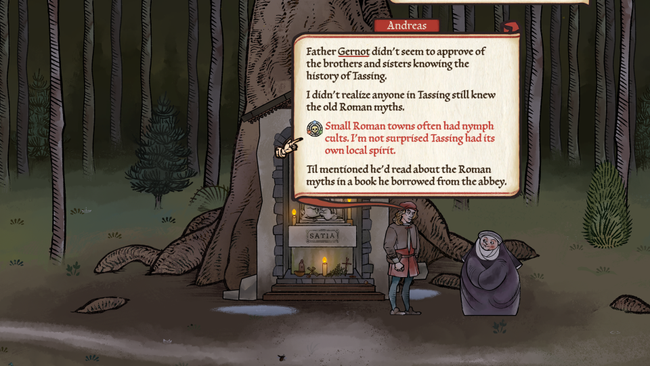
To set the groundwork, Pentiment tells the story of a journeyman named Andreas Maler, an artist working in the scriptorium of the Kiersau abbey, situated adjacent to the Bavarian town of Tassing. As an outsider to the area, Andreas finds himself in a bit of a unique position amongst the inhabitants of the region, working alongside both the Benedictine monks as well as the peasants and citizens of the small farming village. Andreas ends up situated squarely in the center of a murder mystery, kickstarting a story that ends up taking decades to fully resolve that upends both the village itself and Andreas's own destiny.
Outside of this general premise, Pentiment can be a bit of a difficult game to describe as it only shares a small bit of its DNA with most of Obsidian's catalog. Focused almost entirely around dialogue, Pentiment has some gameplay elements reminiscent of contemporary visual novels mixed in with those of classic adventure games -- though there's nothing resembling an inventory. Multiple mini-game-like moments are dotted throughout the story as well, alongside some divergence depending on the player's choices and actions.
While I am far from the first to make the comparison, one game that constantly sprang to mind as I progressed through Pentiment was Disco Elysium. While the similarities between the two games are a bit tenuous, both focus their primary gameplay component almost entirely around dialogue and both deliberately limit the scope of their narratives across a few city blocks, involving only a handful of key characters. However, while Disco Elysium is a bit more open in terms of allowing the player to simply interact with the world to their fancy, Pentiment is a little bit more curated as a narrative, though still does allow the player to have a bit of say in exactly how things unfold.
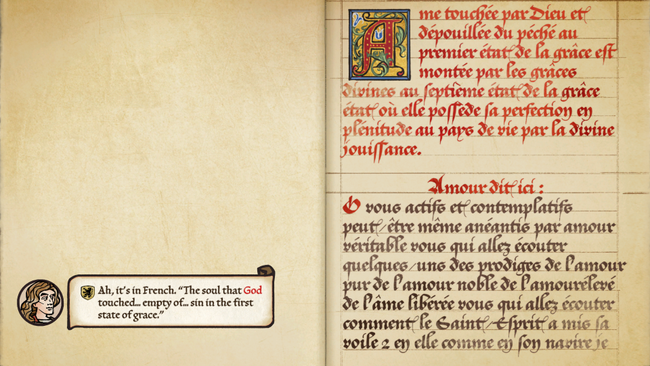
As a game centered around dialogue, Pentiment is as much about script as it is about art and often doesn't really bother to make a distinction between the two. To illustrate different manners of speaking or holding disparate beliefs, many of Pentiment's characters will have different dialogue fonts depending on if they are a less-literate peasant, a monk, or a printer, and so on -- though some of this is somewhat lost if the Easy Read Fonts option is selected in the menu.
In addition to the dialogue being presented as though the characters themselves are hand-writing their lines, the game's menus, journal, and map also share this same visual theme. With the protagonist being contracted to work in a scriptorium while also working on his masterpiece in order to prove his stake as an artist, the resulting package is a wonderfully coherent and consistent visual identity that touches every aspect of the game. While I originally thought the artstyle and limited animation seemed a bit stiff and muted in the initial trailer, the thoughtful construction of the end product between the font selections and color palette had me totally on board within just a few hours of starting my first playthrough.
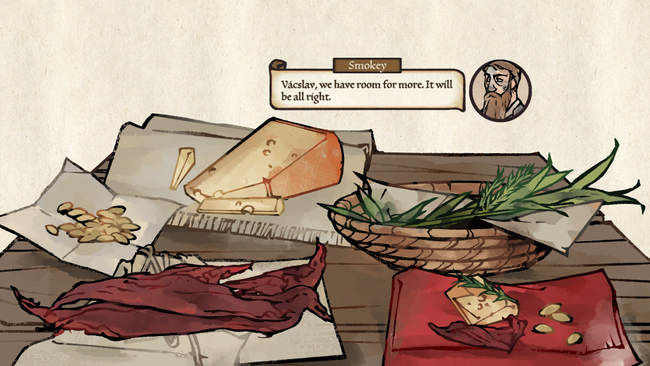
Outside of interacting with the townsfolk and the various inhabitants of the nearby abbey, Pentiment's primary gameplay structure starts off with the solving of a mysterious murder of a visiting Baron. While attempting to piece together the available information in the hopes of identifying a culprit, Andreas finds himself with multiple leads but only a limited amount of resources at hand to follow each one.
While investigating the murder, undertaking certain events throughout the town and deciding to spend time investigating certain leads will cause time to pass, though the format is not as rigid as something like Persona. It's not possible to see every outcome and collect all the evidence in the little time available, so players will have to use their intuition and natural inclination to decide how to spend their time, and even who to share meals with to possibly get the most relevant information possible.
Almost all of the characters in Pentiment are incredibly well-realized. Initially, the sheer number of new faces tested my memory. Between meeting the families of the town's farmers, millers, stonemasons, blacksmiths, bakers, millers, printers, alongside the monks and nuns of the abbey and all of the other ancillary characters, I found myself struggling to keep them all straight. However, due to the frequent interaction with all of these characters in the context of conversations, meals, minigames, and even across the passage of time, I found myself naturally sorting and compartmentalizing all of the information and relationships across Tassing before too long.
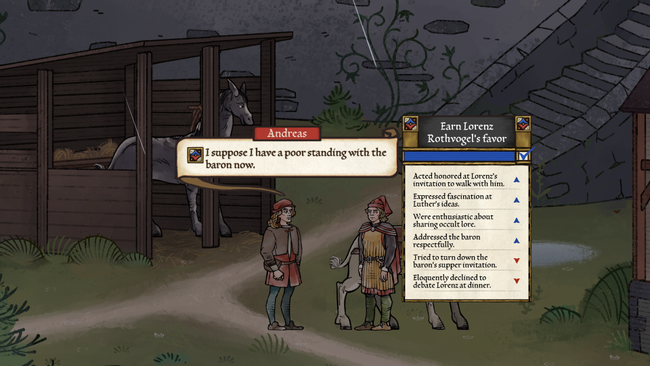
Once I began to recognize and relate the histories of the different families and faces in Tassing, I found myself naturally rooting for certain characters while feeling genuine disgust and animosity towards others. Most importantly, learning about each new facet of these characters' lives and beliefs never once got boring throughout the entire runtime, and I found myself genuinely excited to see how each family would change and progress throughout the course of the game.
Pentiment is divided into three acts, with the first two acts behaving very similarly in this regard. The player is presented with multiple leads to follow, and then they must decide between the options available with this time constraint in mind. Additionally, Pentiment uses almost exclusively an auto-save feature, where decisions and progress made is recorded every time the player changes screens. While there are a couple ways to manipulate this with having multiple autosaves available, the intent seems to be to roll with the decisions made with limited avenues to take back or redo any actions.
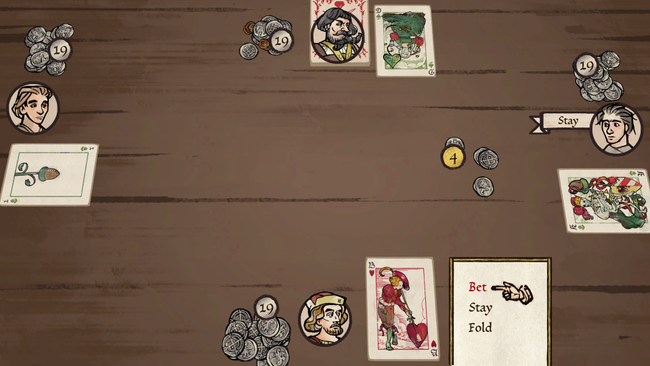
I finished two playthroughs of Pentiment, trying to drastically change my approach and disposition to see the extent to which the narrative would change, especially as the game moved from Act to Act. I found that while certain major aspects of the story are directly linked to the player's actions such as the eventual culprit of the Baron's murder, many others --including the game's ultimate conclusion -- are left relatively unchanged regardless of the player's individual approach.
At first, this disappointed me a fair bit, but this degree of stability also allows Pentiment to have a very consistent overarching theme in addition to its striking visual identity. To share much more than that would potentially spoil the intrigue for prospective players, but the smaller component stories around Andreas's life, the physical history and religious folklore of Tassing's people, and even the motivation of the ultimate antagonist all mesh together to share a clear, poignant message in the guise of a who-done-it.
In addition to that, it was still neat to identify the small ways in which the player's actions can affect the end result of the narrative by the end of the third act, ranging from different characters ending up with loving families, or having different attire, or in some limited cases, whether certain NPCs end up surviving through to the end or not.
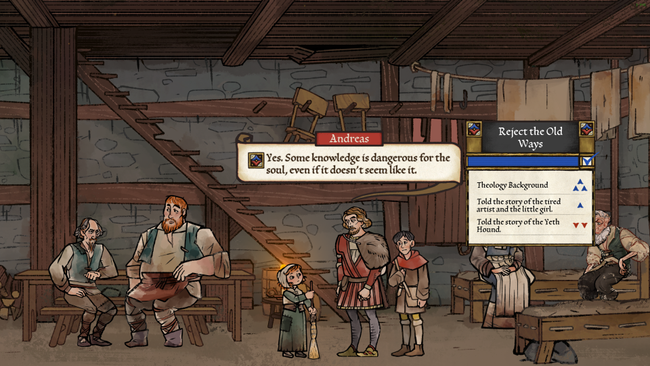
Unfortunately, the final act feels a lot more railroaded compared to the prior two. While my replay in Acts 1 and 2 allowed me to follow different leads, spend meal times in new locations, and identify different culprits. Act 3 of Pentiment is organized in a much more straightforward manner. Instead of having multiple options to explore in a limited amount of time, the player is instead pushed to see key events in order and is seemingly not allowed to progress in any way other than the one prescribed by the game. While this may be done in service of ensuring that the player and story arrive at its final moments in a consistent manner, I still found myself longing for a little bit more agency in the last stretches of the game.
The sound design also requires some getting used to. While there is some music in key moments, most of the time the experience is instead carried by ambient sound effects and the scratching of the dialogue as it is "written". I did feel that the dialogue did write out a bit slowly until I increased its speed to the maximum available setting at the moment, but the more deliberate pacing of the animated text scrawl seemed to match that of rest of the experience and I eventually found myself unphased by the text speed once I had gotten used to it.
Lastly, there were a few places in my replay where I noticed that a few bugs in some of the dialogue logic that still needed to be worked out. I noticed about 6 instances of places where NPCs would reference scenes that I didn't personally witness, or the game would forget that I've already explored a certain location or hadn't progressed past a certain point on one of the game's many branching anecdotes. None of these errors were too drastic nor did they block my progress in any significant way, but it was a bummer to see these blemishes in a game that otherwise exhibited immaculate attention to detail. Hopefully some post-launch support can help clear these few niggling issues up without too much hassle.
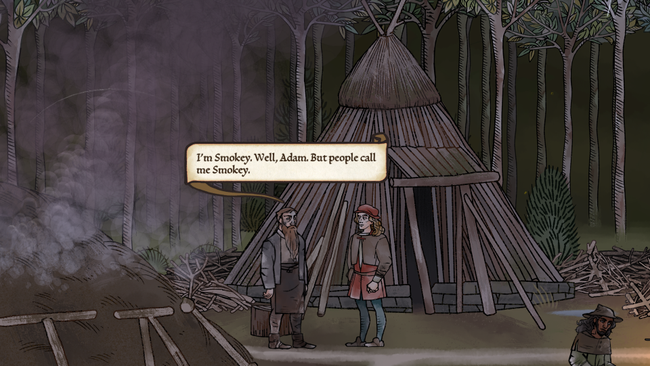
By the time I finished my first playthrough of Pentiment I knew that the experience was one that would fondly stick with me for a long time. Pentiment is an easy game to recommend in the same way that one recommends a favorite documentary to a new friend or a local museum to an out-of-town visitor. Pentiment carries a sort of quiet confidence in which the passion of its creators towards the subject material of the game's setting, art, and theme truly carries through to the final exceptional experience.